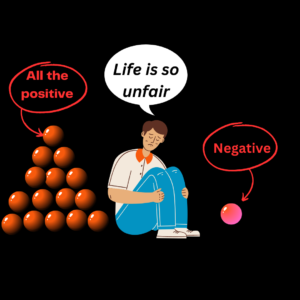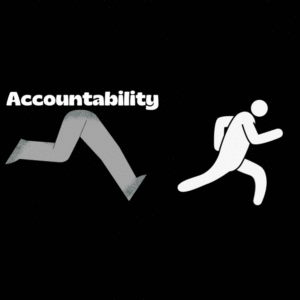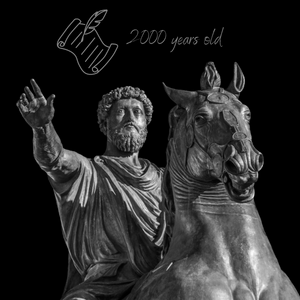Do you enjoy listening to music? Do you feel happy when you listen to it or do you use it to relieve your stress?
When exercising do you need to listen to music? Can you enjoy yourself without any music in the club?
Want to have a happy life with better outcomes?
If you want to have better outcomes, you need to make better decisions. To make better decisions, you need to have good if not great emotional control.
This is what stoicism teaches us and how having a stoic mindset can help you with making the correct judgments in your daily life.
A Stoic Mindset
You might think stoicism is an old way of thinking and does not really translate to our modern way of life.
I mean all these ideas are from some old dudes from over 2000 years ago! It was a time when the emperor Marcus Aurelius ruled over the roman empire and quite possibly was living a great life!
These people and the roman emperor sat on a wooden chair and a table made from stone and animal hides or wood to write on with the feathers of a poor bird as a pen.
The stoic philosophy teaches us that our feelings are fickle, fleeting responses.
The moment you realize and understand this, the better your experiences will be when dealing with the challenges life throws at you and leading a more fulfilling life.
We all would like to believe we have decent control of our emotions but do we actually?
The following will be some of the core principles from stoic wisdom that I think is crucial and should be applied in our everyday life.

1st idea: Dealing with worries and regrets
Most of us have had bad experiences in the past which caused trauma.
Made mistakes and built up a bunch of regrets.
The stoic philosophy teaches us to not dwell on the past so much to the point where it affects our present moment and even our future.
It does not mean to forget about it but instead make peace with it, I mean thinking of scenarios of what ifs will only lead you down to depression.
All we can do is learn from it, take that pain, fuel ourselves, and focus on creating a better future. The important part is how we deal with it.
“Life is very short and anxious for those who forget the past, neglect the present, and fear the future” – Seneca
Why do Regrets affect us so much?
It’s one of the strongest emotional feelings, which we often overreact to and exaggerate past events in our minds.
Building a stoic mindset will help us judge how these memories are benefitting us and let go of the things that hinder our growth.
If they are causing you anxiety then all we can do is keep focusing on the present moment and build a better future.
“Past regrets often stem from thoughts in which we imagine a situation that we would have avoided if we had acted differently.
Following this path, a person can never be satisfied, because there are no possible ways to change the past.” However, if you are content in the present, you can influence the future without regret. (IGOR JANKOVIC)
2nd idea: Reframe your thinking
“Sometimes when things are falling apart, they may actually be falling into place.” ―J. Lynn
Have you tried reframing your thoughts and asking yourself how the negative outcomes and experiences actually served as an important lesson?
You might find out that it happened for the better. Who knows what might have happened if you did not go through that?
Don’t get me wrong, I am not saying we should all experience bad events in our lives. I believe we can make use of every experience to help us grow wiser.
It could always be much worse. What kind of person would you have become if not for what happened?
Can you be certain that if you had experienced something else things would have been much better down the road?
Adversity

“Do not pray for an easy life. Pray for the strength to endure a difficult one.” ~Bruce Lee
I believe going through hardships and pain is necessary in order to live a full life and in some cases, it may even be a good thing.
Nowadays we prioritize looking for shortcuts, try to avoid life’s challenges, and hate the idea of going through discomfort.
Don’t you enjoy watching movies where the main character struggles, deals with all sorts of challenges, and in the end manages to come out victorious?
Sure such suffering is not fun to go through it, but it is essential. Nobody enjoys going through failure, but life’s hardness is part of what makes it so incredible.
How to get stronger and bigger muscles? By breaking down your muscles and damaging the muscle fibers will your body begin repairing them and making them stronger.
“I’m just making a conscious choice to perceive challenges as something beneficial so that I can deal with them in the most productive way” – Jim Carrey
The negativity bias

“We humans have a tendency to give more importance to negative experiences than to positive or neutral experiences. This is called the negativity bias.”
“We even tend to focus on the negative even when the negative experiences are insignificant or inconsequential. “(Healthline)
Think about the times when you have received compliments from your friends or colleagues. You probably felt flattered and simply went on with your day.
Now compare that to a single mocking comment. It affected you more deeply, consumed your thoughts, and maybe even carried over for days, weeks, or even months.
- Focusing on a person’s negative qualities rather than their positive attributes.
- When you’re feeling depressed, you search for things that confirm those feelings.
- Bad news makes us more alert since it grabs our attention.
- The cringe and embarrassing moments tend to stick with us even if others don’t recall them.
Cognitive behavior therapy uses the reframing technique where you practice noticing your cognitive distortions such as a biased view, you point it out to yourself.
Evaluate the evidence and think solely about the facts. Remove your thoughts and emotions from the situation.
Do not avoid pain

Build resilience and avoid cheap dopamine to escape the pain just to have a short-lived moment of peace of mind.
The attempt to escape from pain is what creates more pain. Pema Chödrön a Buddhist teacher explains this quite well:
“Most of us do not take these situations as teachings. We automatically hate them. We run like crazy.
We use all kinds of ways to escape — all addictions stem from this moment when we meet our edge and we just can’t stand it.
We feel we have to soften it, pad it with something, and we become addicted to whatever it is that seems to ease the pain.”
3rd idea: Perspective
“And those who were seen dancing, were thought to be crazy, by those who could not hear the music.” ― Friedrich Nietzsche
Life is based on your perception.
Perception is based on your opinion.
The opinion is based on your thought.
The thought comes from your mind.
Having power over your mind changes your life.
Similarly, how often have you or others said that illness or rejection was the best thing that could happen to them?

Look carefully, and describe what you see. Do you see a woman? How old is she? What is she wearing?
Do you see a young, stylish woman in her 20s? Dressed to go out on the town? Or, do you see an unfriendly, old woman with a big hook nose, wearing a shawl?
Two people can have different opinions, yet both be correct.
A quick story: Maybe just maybe
Fear
Whenever I am put into difficult situations not certain what to do or worried about the outcome, I tend to shy away from it.
- Striking up a conversation with a stranger
- Asking someone out on a date
- Jumping off an airplane
- Starting a new business
That feeling of fear comes mainly from when we are either afraid of what “might” happen and how others “may” see us.
These kinds of fear are called irrational fears which we have no control over, such as the behavior of other people, how others are seeing us, and the possibility of how it may go wrong.
What I like to do whenever I am facing my fears is think to myself “What’s the worst thing that could happen and will I still be able to live regardless?”
4th idea: Ego
“The ego relies on the familiar. It is reluctant to experience the unknown, which is the very essence of life.” ― Deepak Chopra
In stoic philosophy one of the most destructive things is to let your ego be in control.
How can you know if you’re moving from an ego-oriented mindset?
- Constant seeking of approval
- Overly focused on the outcomes and calling yourself a perfectionist
- Not persistent and quits easily as outcomes are difficult to achieve
- Looks for people and things to blame
- They cannot perform under pressure and get anxious if people are looking
Accountability

One important characteristic to have and to practice stoic philosophy is to take responsibility and have the humility to know you don’t know everything and tried everything yet.
Let’s say you’re trying to lose weight but you fail several times and since you don’t like the feeling of failing you would like to believe it’s impossible for you or it’s not your fault.
You come up with a bunch of excuses rather than looking for solutions to confirm those beliefs.
- “I’m just big-boned”
- “My situation makes it difficult”
- “I don’t have enough time”
- “Why bother, I am perfect the way I am”
Translation:
- “It’s not fair I need to put in more work”
- “My parents made me like this”
- “I only have time to watch videos”
- “People should accept me for how I am”
It is impossible to begin to learn that which one thinks one already knows. -Epictetus
Self-mastery
In order to make sure you’re not doing things based on your ego is to ask yourself “am I playing to win or playing not to lose?”
This basically means are you too concerned about the outcome if you are going to win or lose.
Stoicism tells us that external events are not in our control and that in order to win we need to find strength from within.
Taking action despite your fears can help you discover how much you are capable of.
Keep asking yourself what can I do better? Gain confidence by having undeniable truth about your abilities with the constant pursuit of excellence.
Happiness
“The secret of happiness is not in seeking more, but in developing the capacity to enjoy less.”-Ryan Holiday
All of us desire happiness and believe it’s something to be pursued. However stoic philosophy says happiness isn’t a destination.
Most people think it’s something similar to ticking a box of things like a great job, fancy car, traveling every year, etc.
This makes us prioritize what we don’t have instead of being grateful for what we do have. Whenever you feel like you are lacking something, it’s no wonder that you may be unhappy.
False Stoicism mindset
“So you just need to be emotionless like a robot”
Not at all, “Many Stoics such as Marcus Aurelius, frequently cried during inevitable tragedies. However, he would chastise himself for expecting the world to be perfect or for everyone to act correctly.
When he did experience tragedy, he trained himself to process the pain without denying it. He did not allow his grief to control him.” (become an individual)
It’s not about you shutting yourself out of the world, you may care about the starving people in Africa or be proud of your achievements.
It’s not that you don’t care what happens to your loved ones or the world. You can feel your emotions but
But attempting to influence the world with the best effort you can make, and not focus on whether it actually turns out well.
What you should focus on is the prioritization of what you can control and cannot.
Conclusion
With the revival of Stoic philosophy and its’ popularity in recent years. It has become certain to me that people have begun to seek wisdom using ancient philosophy from ancient stoics.
Hope you can find value in the stoic philosophy and use them to lead a good life and improve your well-being. Stoicism emphasizes leading a life of virtue and not being bothered by external circumstances.
I believe stoic wisdom is essential for surviving and thriving in good or bad times. Of course, all the above is based on some research and my understanding and it’s not meant to be perfect.
Find out what your belief system is and find out what motivates you. What will yours be?


